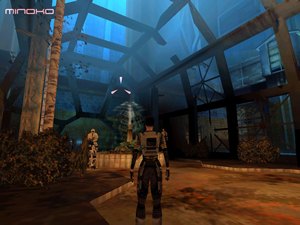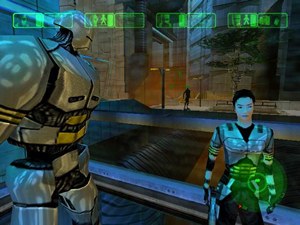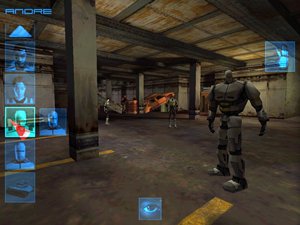A puzzling project.
Imagine a future where overpopulation has led to only one solution for mankind’s
need for space – going vertical. It seems that the land is pretty much a moot
point, so for years and years people have been building up, up, up, so high up
that generations have passed and what lies on the lower floors is considered history.
Now imagine that something has gone awry and people are dying and you have to
go back down through the floors to find out what’s happened, who’s responsible,
and who can still be saved.
Guess what? You’re not imagining anything. You’re playing Project Eden,
a singularly difficult game to review because it serves a specific function
wonderfully, but delivers nothing else. You see, this is a puzzle game masquerading
as a squad-based action game set in a labyrinth of meat grinders and pipes and
industrial equipment.
You
control four members of some crack squad of good guys. The characters each have
specific skills that must be used to traverse the game’s legions of puzzles.
Your leader, Carter, can open certain doors; Minoko can hack into computer systems;
Andre can fix broken stuff; and Amber is immune to environmental damage since
she’s a big cyborg.
Each skill (except for Amber’s) applies to a distinct looking panel or terminal
that clearly indicates which person is needed for the job. Very simple. The
actual execution of the skills is even more straightforward. Since Carter is
clearly retarded, all he has to do is touch his panels and they work. Minoko
is slightly less stupid; she has to click on a circle the moment a little moving
dot orbiting it enters a specific region. Andre is the smartest, as he has to
watch a little notch move down a meter and click when it’s in the appropriate
segment.
The skills don’t develop, and their actual implementation is marginally creative
and a little frustrating (especially Andre’s). However, the conjunction of the
skills in the face of a huge, multifaceted puzzle is where Project Eden
shines. As opposed to solving one lame puzzle every so often, the player is
faced with elaborate, sustained puzzles that are usually composed of several
smaller, inter-related puzzles.
The puzzles are tied into the environment, creating a nearly seamless integration. The result immerses the player into the problem at hand and gives the puzzles themselves greater depth and importance.
However, this sense of immersion is routinely broken. For one thing, nothing
really happens when the puzzles ‘end’. There are good bursts of continuity in
which the player gets sucked into the game, but these always come to a stark
finish with little to show for the last puzzle. These gaps are where a story
or skills or should develop, but alas, Project Eden is lacking in both.
The levels themselves generally contain a center around which is situated all
the big puzzles. The effect is eerie; though the levels seem huge, you can always
find your way around and you always wind up back at the same place. Since your
progression through the world of Project Eden is vertical, the center
of the levels is almost always an elevator, which contributes to Project
Eden‘s segmented feel. As opposed to a fluid progression, you get levels,
literally.
While there is some action in Project Eden, there are few weapons,
the enemies are unimpressively stupid and they take a lot of punishment. Your
characters aren’t very agile either, so most fights involve “rolling,” which
is accomplished by ducking and strafing. You roll out, pop off a couple shots,
roll back in, and repeat several times until your foe is no more.
Every once in awhile the enemies will chase you. This can be kind of fun because
you’ve got to run around while trying to shoot a quickly moving target, and
in third-person view mode (you can toggle between first and third) the visual
effect is convincing and well animated.
The graphics in general are solid. Tthe outdoor environments stand out, while
the indoor portions get a bit bland and generic, often times just feeling like
an average corridor first-person shooter. But the overall look is smooth.
 Project
Project
Eden‘s story progression is sparse. For a team that has to work together
to stay alive (even though you’re essentially immortal), no one ever has anything
to say. Nobody talks. Ever. There are little cut-scenes where the story unfolds,
but these are isolated and segmented like everything else in the game. Speech
in Project Eden is exclusively a vehicle for relating new mission objectives.
Character development is exclusively relegated to the thirty-second cut-scenes.
This game is pure intellect, zero soul.
The lack of music is passable and contributes to the game’s heavy, melancholy
mood, but the presence of sirens and alarms is not. A grating, repetitive, blaring
alarm only adds to the frustration of several of the puzzles and contributes
to an atmosphere of helplessness. It’s just not pleasant.
Speaking of frustration, you die all the time. Every time one of your characters
die they’re resurrected at one of the several resurrection machines throughout
each level with no penalty or loss. Death is cheap in Eden, and so is
life.
And so is the fact that none of your characters can jump. You have to trot/run (it’s confusing, but your players start off trotting, then start running after about ten steps) through all sorts of obstacles, and timing the transition and taking the two different speeds into account is hard and irritating.
Changing between characters is a breeze, but controlling a character you aren’t using isn’t an option. There are no orders other than “Follow me” and “Halt,” so telling a character you aren’t using to take cover or simply duck is an impossibility. The inability to influence characters you aren’t using undermines the whole squad-based aspect of the game, reducing the “team” to four people with one mind.
Naturally, Project Eden‘s multiplayer is a few frags short of a bloodbath,
with its limited weaponry and general lack of violence. You can play cooperatively
with friends, but the person who has to be Minoko is gonna get awfully bored
sitting in front of a computer console for a couple hours.
Despite its pitfalls, Project Eden is a decent puzzle game and will
genuinely tease your gray matter. While a nice change of pace from fragfests
like Red Faction, though, it shouldn’t be considered
a complete package. Instead, Project Eden delivers a nice diversion for
those who like to sit back and solve some quiet puzzles without having to deal
with an engrossing story or hectic action. Its lack of good story, character
interaction or fluid action holds it back from being the best project it could
be.

-
Puzzles within puzzles
-
Cool architecture
-
At times immersive...
-
...at times, not
-
Rudimentary action
-
Bland story







